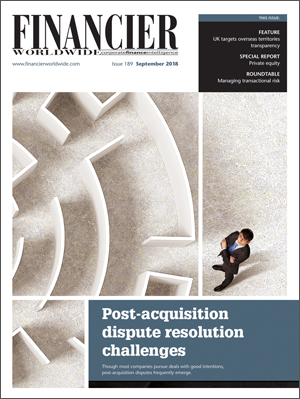Impact of the DOJ’s new Corporate Enforcement Policy
September 2018 | FEATURE | FRAUD & CORRUPTION
Financier Worldwide Magazine
In late 2017, the US Department of Justice (DOJ) announced a new Corporate Enforcement Policy to guide prosecutors charged with overseeing Foreign Corrupt Practices Act (FCPA) violations. This new policy expands upon the DOJ’s FCPA Pilot Programme and, according to US Deputy Attorney General Rod Rosenstein, would act as a “step forward” in fighting corporate crime. According to Mr Rosenstein, the Programme could be improved in certain respects and the amendment would do just that, by further encouraging voluntary disclosures of FCPA misconduct.
Under the Pilot Programme, the DOJ has announced that it would consider mitigated penalties for companies that voluntarily disclosed FCPA violations, fully cooperated with the government’s investigations, and agreed to remediation measures. The Enforcement Policy goes a step further than the Pilot Programme, however, and notes that there is a ‘presumption’ that a company will be offered a declination in exchange for its cooperation. The Pilot Programme only stipulated that the DOJ would ‘consider’ a declination.
The Pilot Programme was undoubtedly a success. Between April 2016 and October 2017, according to the DOJ, the scheme resulted in a 66 percent increase in voluntary disclosures by companies, and corresponding decisions by the DOJ to not prosecute. The now-permanent version of the Programme is written into the US Attorneys’ Manual (USAM), and this is expected to encourage further applications.
Features of the policy
In addition to the presumed declination, there are three other key features of the new policy. First, if a company voluntarily discloses wrongdoing and satisfies all other requirements, but circumstances require the DOJ to take enforcement action, the DOJ will accord, or recommend a 50 percent reduction off the low end of the US Sentencing Guidelines fine range and will not appoint a monitor, in the event that the company has implemented an effective compliance programme.
“The decision of whether to self-disclose is a difficult one, and must be made on a fact-based, case-by-case basis. Parties must assess the merits and risks of self-disclosing as anti-corruption enforcement activity continues to gather pace.”
Second, the policy provides details about how the DOJ evaluates an appropriate compliance programme, which will vary depending on the size and resources of a business. It also notes that hallmarks of an effective compliance and ethics programme include fostering a culture of compliance, dedicating sufficient resources to compliance activities and ensuring that experienced compliance personnel have access to management and to the board.
Third, companies can still be granted a 25 percent reduction off the low end of the US Sentencing Guidelines range by the DOJ even if they did not voluntarily disclose any misconduct, but later fully cooperated and timely and appropriately remediated, in accordance with the policy’s requirements.
Concerns
While businesses, particularly those in danger of having enforcement action taken against them, may welcome the new policy, companies and their counsel must be wary of accepting any offers from the DOJ. Though, as noted, the policy is now enshrined within the USAM, the FCPA policy’s text offers some latitude to prosecutors to determine whether a company met the declination requirements. If the company is found to have failed to meet the requirements it could face a full prosecution by the DOJ. Language such as “timely”, “reasonably” and “all relevant facts” contained within the guidance, may create some confusion for parties and allow the DOJ the leeway it needs to pursue a company, perhaps where it is not necessarily warranted.
Given that voluntary disclosures have increased and the Pilot Programme was relatively well received, what has sparked this change in approach from the DOJ? Primarily, there is hope that the policy will improve overall FCPA enforcement by encouraging more voluntary self-disclosures. Companies may be incentivised to report any corporate bribery cases that they may have overlooked in the past, but are now fearful of being found to be in breach.
Furthermore, the new policy provides favourable terms to companies that do not voluntarily disclose misconduct, so long as they later fully cooperate and implement a remediation programme.
The policy has also underlined the importance that the DOJ places on tackling white-collar crime. It wants prompt voluntary self-disclosure of violations, full cooperation with DOJ investigations, meaningful remediation and the implementation of effective compliance programmes.
In the short term, the changes to the DOJ’s approach appear to have been successful. 2017 was an “historic year”, according to the chief of the DOJ’s FCPA unit, Daniel Kahn, with numerous guilty pleas and verdicts, as well as large global resolutions. Between the DOJ and the US Securities and Exchange Commission (SEC), there were 39 resolutions with companies and a significant number of enforcement actions against individuals. The pace of activity has continued in 2018. Two new corporate enforcement actions were announced in the first week of July, taking combined DOJ/SEC actions to 17. There has been a mix of enforcement activity, ranging from relatively modest to very large financial penalties against companies including Dun & Bradstreet, Panasonic Corporation, Société Générale and Credit Suisse.
Parties facing a possible FCPA violation must tread carefully and seek expert advice at the earliest opportunity. Experienced anti-bribery counsel should consult with internal staff and conduct a thorough investigation. The decision of whether to self-disclose is a difficult one, and must be made on a fact-based, case-by-case basis. Parties must assess the merits and risks of self-disclosing as anti-corruption enforcement activity continues to gather pace.
© Financier Worldwide
BY
Richard Summerfield

